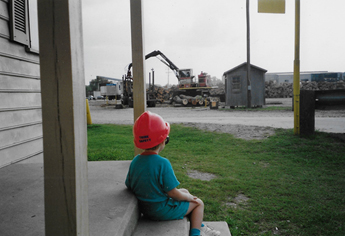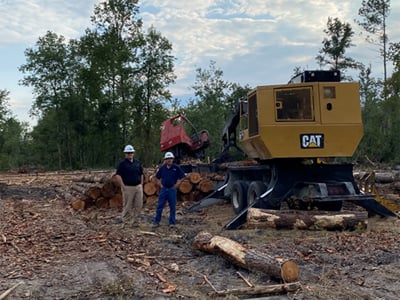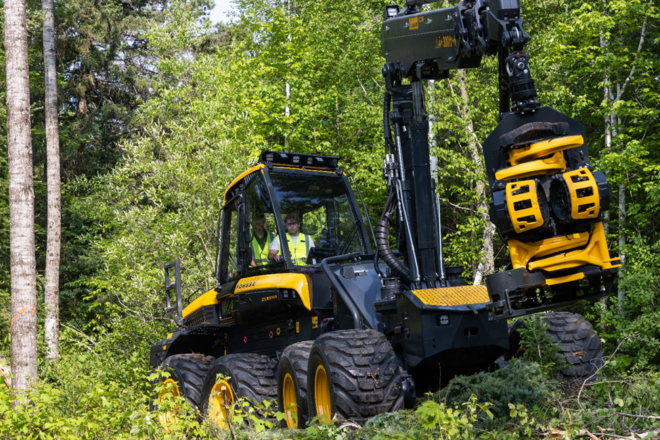Big Boots to Fill

Forestry is a constantly growing industry – literally! From the trees themselves to the people in every corner of the forest products supply chain that make use of this renewable resource, growth is both continuous and inevitable. Throughout history, many leaders have emerged in the forestry and wood products sector; some were born into it, some were chosen, and others were forged. However, there is more to being a leader than a title, a name, or a reputation. In my opinion, a true leader must decide how they want to be perceived and lead based on that example, knowing that their legacy will be passed on by those around them. Through this blog opportunity with the Forest Resources Association, I hope to share some of the industry leaders and experiences throughout my life that inspired me to pursue this profession.
For me, starting out in the forest industry may have seemed not only natural but inevitable. My father has been an active forester since I was born. My great uncles were involved in the forest industry for many years, and several other ancestors on both sides of my family tree (pun intended) were actively working with some form of timber. It’s almost as if there wasn’t even an option for another career path. That said, my foray into the industry has definitely been encouraged along the way but never forced. It was growing up around so many different personalities in the ‘business’ that made my love for all things forestry as solid as a lightwood stump. Even though my route to where I am today has been less than traditional, I still ended up where I always knew I would, working in an occupation that’s not only in my DNA but is in my heart and soul.

When I was young, my father was working in procurement with Georgia-Pacific Corporation (GP). Every time I went to work with my dad, it was like Christmas. During the holidays, I normally ended up receiving a model log skidder or stumper, so seeing the real thing was a big deal. You might be thinking, what’s so great about riding around trying to find timber all day, constantly being on the phone with loggers and wood dealers, then going back to the office to do paperwork? Trust me, when you’re younger, it’s a lot more exciting. Many days instead of just going home and watching cartoons after school, I was hoping that my mom was going to drop me off with my dad. From checking on loggers in the woods to watching log trucks come into the mill at Prosperity and seeing the finished products leave the mill, those days were always full of excitement. As I got older, I came to realize that those afternoons were instrumental in laying the groundwork for the passion that fuels me today. I know that I can’t name everyone during the GP years that helped solidify my career path, but I will do my best. David in Rocky Mount, Rick, Tom, Billy, Wayne, Roz, and Tracey at Prosperity, Charles at McCormick, Peanut, the Williams Family at Log Creek, and many others during our family’s years in South Carolina.
I was in middle school when my father became the Director of Operations for the Hofmann Forest, and our family had moved back to my mother’s home in Jacksonville, NC. The Hofmann, an approximately 79,000 acre intensively managed working forest, was like having heaven in my backyard. This opportunity allowed my formative years to be spent in the same way as my youth. When I wasn’t in school or at ball practice, I was in the woods trying to learn everything I could about what I hoped would be my future job. It was during this time period that I had the opportunity to intern at the Hofmann through my local high school career and technical education program. This experience paired me with a senior forester, Mr. Lee, who was and still is one of my greatest mentors. Mr. Lee used to tell me, “Always pay attention, be mindful of what’s going on around you, and don’t be afraid to ask questions.” Even though there was a lot of education and instruction throughout the year, Mr. Lee and I always managed to have fun.
Through this experience, I learned to appreciate first-hand what it meant to utilize a knowledge base that had taken someone a lifetime to build in order to best implement the working principles of forestry. I was taught more about forest management in this short period of time than most people learn while trying to obtain a bachelor’s degree. The rest of the Hofmann staff: Pops, Joe, Dad, Kenny, and John; as well as all of the wood dealers, loggers, subcontractors, and support staff, who shared a wealth of knowledge that helped me to understand not only what forestry and the wood supply chain are but how science, technical, and business functions occur on a daily basis to contribute to a working forest.
After high school, I was accepted to North Carolina State University, where I started out in forest management in the College of Natural Resources (CNR). Then, as many college students do, I digressed down a different path and ended up with a history degree and a lot of forestry and natural resources courses. Yet, as my former CNR advisor, Dr. Barry told me years later, when I was working for the NCFA, “Justin, I always knew that you would be fine.” Although I didn’t major in forestry, I still did my best to stay close to the industry while in school. Along with the occasional CNR elective course, I was able to complete an internship/part-time job with Claybourn Walters Logging Company. This opportunity showed me what the day-day of the industry was really about. Even though I had seen the science and implementation of forest management principles at the Hofmann and studied the accompanying coursework in the classroom, I knew that hands-on knowledge is still bar-none the best experience you can have in this business. Working with loggers and mill representatives was always insightful, but it was never a one-size-fits-all situation. Challenges and adversity are to be expected in any line of work, particularly outdoor industries like forestry, where the weather is a deciding factor. Markets and timber availability are also to be taken into account, but at the end of the day, timber cruising and landowner interface were really essential to understanding what it takes to work in procurement.
My next chapter after graduation from NC State was like most college students; uncertain with student loans. A job opportunity opened with the North Carolina Forestry Association (NCFA) for a Communications Coordinator position, and, as a student member of this organization, I thought that applying for the job would be a logical decision. Thankfully, I was selected for the role. While at the NCFA, I became more knowledgeable about how truly inter-connected our industry is. It was remarkable to meet so many people and experience so many of the facets of forestry that work together to form one of the greatest supply chains on the planet. My own contribution to the association was to build a new website from the ground up for the benefit of the membership and to provide members with a new magazine to tell their stories and the good news of the forest industry in the state of North Carolina. In the trade association side of the industry, it was really the events that set the experience apart for me. The NCFA Annual Meeting, Forestry Day in the Legislature, and the Mid-Atlantic Logging & Biomass Expo. All of these events were exponentially beneficial as a young professional trying to network and gain knowledge about the industry. Although my time at the association was fairly brief, it was a great platform for me to better comprehend the complexities of our industry, as well as to meet people from all aspects of the forest products network. I was fortunate to meet numerous people working in and with the forest industry while working at NCFA, and I know that I cannot possibly name them all or the impact that they had on me. However, I can say that every one of the people I met contributed to who I am today, and for that, I am thankful.
In April of 2020, my parents and I were having a discussion on the phone one evening about my career and my future. I told them that I loved my job at the association, but something was missing. I’ll never forget their response, “Justin, you should come home.” They were absolutely right. My time at NCFA had come to an end, whether I knew it or not. I was needed elsewhere. A year earlier, my father had started a forestry consulting business after nearly 40 years of working in the private sector of the forest industry. His experience, combined with his reputation in the area as a qualified forester when it comes to timberland management, helped him quickly gain clients for his new consulting firm. The business was already taking off, but as soon as he and I started working together, we were able to accomplish more and continually expand our client base. We have truly been blessed. Now that I am back home, it is a constant privilege to not only apply the knowledge of the wood products supply chain that I have learned but also to see the world I grew up in through new eyes. Building on lifelong relationships and creating new ones with our clients while being good stewards of the renewable natural resources that we work with is beyond rewarding. Our business is a passion for both my father and me, but the best part for me is that I am working with my greatest mentor every day: my dad.
Who I am as a working professional in the forest products sector is exemplified through my background and, moreover, the people and experiences that have had an impact on me. On this journey, I have found that leadership qualities are built upon through your own experience and the shared experience of others around you. However, it is your character that really makes you who you are and how you want to be remembered. My mentors in forestry helped to shape me into the professional that I am and, for that, I am eternally grateful to all of them. I am also very thankful for my family for raising me to have a true moral compass and a code of ethics, which continue to guide me today. Opportunity has knocked along the way and helped me to grow faster in some situations.
Nonetheless, as everyone who has spent any time in this business will tell you, no two years are the same. We all have ups and downs, highs and lows; some parts of the job are good, some parts are bad, and some parts are just downright ugly. But growth is part of life, and as with trees, people are influenced by others around them to become products of their environment. I count my blessings every day that the boots I am working to fill are some of the best in the business.


